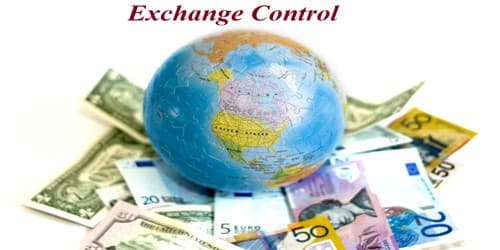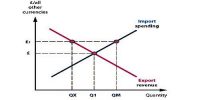Exchange controls are legislative limitations on the purchase and/or sale of currencies. The principal purpose of most systems of exchange control is to prevent or redress an adverse balance of payments by limiting foreign-exchange purchases to an amount, not in the surplus of foreign-exchange receipts.
Foreign exchange control is defined by Haberler as – “State regulation exchange the free play of economic forces from the foreign exchange market”.
In short, the government to regulate the payments dealings in foreign exchange and import-export of currencies is called Exchange Control. These controls consent to countries a better degree of economic constancy by limiting the amount of exchange rate instability due to currency inflows/outflows.
Objectives of Exchange Control: There have been varied objectives of adopting the system of exchange control by governments’.They are –
- Over-Valuation
Some countries resort to exchange control to keep their currencies overvalued. Under this, the foreign exchange value of the currency is fixed at a higher level than allowed by market forces. The currency is overvalued for three reasons. First, the country is engaged in the development process and needs raw materials and capital equipment from abroad and the second country has to repay foreign debt. When the country overvalues its currency, its country becomes dearer relative to other countries. So it pays less to other countries in terms of its currency both for imported goods and for repayment of foreign debt. However, exchange control for the purpose of overvaluing the currency can be adopted only as short term measure. In the long-run, it will lead to an adverse balance of payments, because export become dearer and imports cheaper with the overvaluation of the currency.
- Under-Valuation
Some countries also exercise exchange control to keep their currencies undervalued. This is done for suitable exports and reduce imports and to raise the general price level of the country. But such a policy can succeed only in the case of a small country, whose participation in the world trade is insignificant. But if a large country were to adopt this policy, it will lead other countries to retaliate and follow this policy, which is highly dangerous for the world economy.
- Stabilization of Exchange Rate
Exchange control is adapted to stabilize the rates of exchange. Fluctuating exchange rates harm commerce and industry. The government, therefore, adopts exchange control measures to stabilize the exchange rates by announcing conversion at the official fixed rates of exchange.
- Prevention of Capital Flight
Another objective of exchange control is to prevent the fight of capital from the country. Gold and capital funds cannot be exported. Without the permission of exchange control authority. The latter may totally ban such movements or give specific purposes. In this way, exchange control not only prevents the flight of capital but also conserves foreign exchange.
- Protection to Domestic Industries
Exchange control is resorted to for giving protection to domestic industries against foreign producers. The exchange control authority controls the imports of such commodities which compete with domestic producers and thus protects them from foreign competition.
- Help to The Planning Process
Exchange control helps the process of planning by controlling the non-essential and wasteful expenditures on imports and encouraging the flow of exports. The exchange control authority encourages the inflow of essential raw materials, capital goods, and technical know-how by allocating scarce foreign exchange ‘resources. Such imports are needed for execution of plan projects.
- Remedying Unemployment Balance of Payments
Exchange control is introduced to remedy the adverse balance of payment. This is achieved by checking and regulating imports and foreign exchange.
- Repaying Foreign Debt
One of the objectives of exchange control is to earn and conserve foreign exchange for the purpose of repaying the principal and interest changes on foreign debt.














